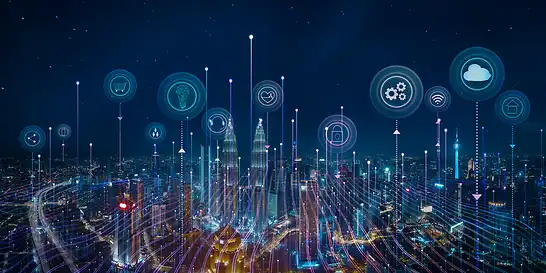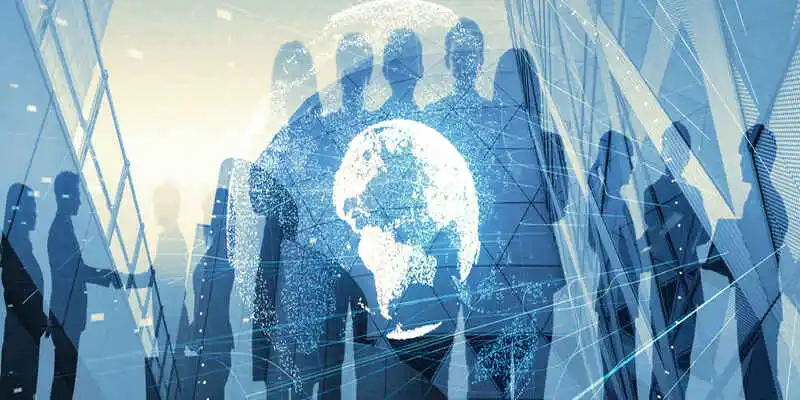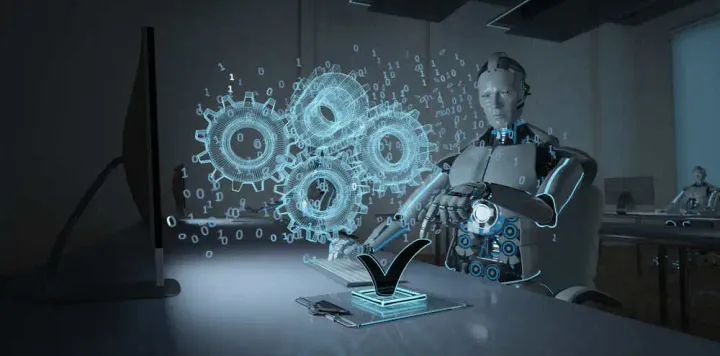What Could AI Achieve by 2030?
Half of this decade is out, and AI is living up to the hype. Do you think AI will sustain this momentum and continue surprising us, or has it achieved its maximum? Let’s explore! As this rapidly evolving domain is hard to predict, we will extend our foresight to a five-year horizon, i.e., by 2030.

The world is changing in each bit of time. Thanks to AI! With every passing day, AI is making all its promises a reality. The 2020s decade was the "AI buzzword decade." It was an era of AI hype and headlines. In the early 2020s, AI moved out of research labs into public consciousness and became a mainstream concept. Most of the attention, investment, and discussion revolved around artificial intelligence. It became one of the most talked about and anticipated technologies of the era. By the end of the 2020s, we witnessed the mass adoption of AI while shaping industries, lifestyles, and routine tasks. This significant momentum of AI in the 2020s set the stage for the decade 2030, where we see it becoming deeply embedded in our lives, industries, and decisions. This rapid momentum of AI signals its trajectory as a revolutionary force by the end of 2030.
The global AI market is predicted to grow significantly at 37.3% CAGR and reach $1.8 trillion by 2030. PwC report states that AI will boost local economies by 26% in GDP. Experts believe that every industry and profession will experience a major shift in how they operate and function. Our lives will also experience a transformational change in ways that have been imagined in the sci-fi world only.
Let's have a look ahead to 2030 to predict what AI holds for our future. We will have a glimpse of the revolutionary power of AI that will impact our major sectors, lifestyles, and society.
HealthCare
The healthcare industry's aim to deliver exceptional care, reduce costs, and improve patient outcomes makes it a promising domain for AI technologies. The Cleveland Clinic predicts that the healthcare AI market will grow substantially and hit $188 billion by 2030. It shows AI will significantly transform healthcare in different ways.
Here’s what makes experts predict a major shift in healthcare:
Many Health Tech Startups are making Joint Ventures.
The growing collaborations between Health Tech startups indicate that they are increasingly prioritizing AI to drive transformative change in the coming years. Let’s have a look at a couple of use cases to visualize how they pave the way for this!
Avant Technologies Ventures with Ainnova Tech for AI-driven Treatment of Diseases
Recently, a joint venture between Avant Technologies and Ainnova Tech has resulted in the formation of a new company called “Ai-nova Acquisition Corp (AAC).” This partnership aims to bring Ainnova’s VisionAI platform and retinal camera to the market in Europe and North America. This AI tool, VisionAI, using retinal scans with high accuracy, is already used to identify Diabetic Retinopathy, which is one of the most prevailing diseases among diabetics and a major cause of blindness. About 30% of 500 million diabetics are more likely to develop Diabetic Retinopathy. Unfortunately, the diagnostic error rate for this disease is 49%. Moreover, the worldwide shortage of ophthalmologists highlights a critical need to find innovative ways to treat it. This joint venture is the beginning of commercializing AI-powered healthcare solutions that can bring a major revolution in the healthcare sector by 2030.
HEALWELL AI Ventures with WELL Health Tech
WELL Health Technologies is a multichannel digital healthcare company with an extensive network of clinics, while HEALWELL is a healthcare AI startup that provides AI tools for preventative care. Both companies have teamed up to improve AI-based clinical trials and make them more efficient, accessible, and faster, benefiting both patients and healthcare providers. This venture aims to facilitate patient recruitment and accelerate the development of new treatments.
Health Tech Companies Are More Focused on Providing AI-driven Healthcare Solutions
Health tech companies are more focused on providing AI-driven solutions, from predictive diagnostics to personalized treatment plans. With enhanced AI’s integration into medical systems, it seems set to revolutionize healthcare by 2030.
ResMed Inc., a leading company in healthcare tech, is working on AI-powered tools to make treatment personalized and easier for patients. The company has introduced AI tools to help sleep apnea patients. By working with smart wearable devices and generative AI, they give patients customized insights into their sleep health.
Clover Health Investments, Corp. is a physician enablement tech company making accessibility of healthcare solutions to everyone on Medicare. The company has introduced a software platform called Clover Assistant AI to collect patient data from different ecosystems. This aggregated data helps clinical decision-making and boosts health outcomes by enabling early identification and managing chronic diseases.
Robot-Assisted Surgery Is Set to Triple In Size By 2030
According to a study, the global robotic surgery market will annually grow at 13.7% on average and become a $21.5 billion industry by 2030. Most robotic-assisted operations will be conducted in general surgery (48%), followed by Urology (16%), Gynecology (13%), and Orthopedics (12%).
AI is all set to deliver faster, cheaper, and more accessible healthcare solutions worldwide
Gene Mapping and CRISPR technology will become more common, enabling more accurate modifications of DNA sequences. Transhumanism, i.e., enhancing physical and mental capabilities through AI implants, will surge in popularity. AI will provide customized, effective, and cheaper treatments by analyzing the patient's genetic makeup and medical history. AI-driven devices like sensors and wearables will allow patients to be remotely monitored. It will be predicting organ failure. Identification of suitable organ donors using 3D printing will become easier. An AI-optimized transplantation procedure will increase the success rates of transplants. Clinical trials for drug discovery will become more efficient, accurate, and cheap when using ML algorithms. All these breakthroughs will help improve patient outcomes.
Transportation
Autonomous Vehicles (AVs), equipped with LiDAR, sensors, cameras, and AI, are self-driven vehicles that allow driving on public roads without human intervention. Major Companies Investing in AVs include GM Cruise, Tesla, and Waymo.
Some AVs like Roboshuttle- a shared autonomous minibus, are already being tested. Experts claim that AVs will become ordinary by 2030. The self-driving cars, buses, and trucks will navigate roads and highways more safely and efficiently. AI will help optimize routes and reduce delivery times, thereby transforming logistics and supply chain management. It will bring a drastic transformation to road infrastructure and daily commutes. The use of AI in transportation will reduce emissions, improve air quality, and will facilitate urban growth and a sustainable environment.
Entertainment
The entertainment industry is undergoing a vibrant shift powered by AI. From music composition and video editing to scriptwriting and digital art, AI tools are assisting creatives to a great deal. At present, AI is either working behind the scenes to streamline the content creation process or replacing the artists themselves. Companies like ScriptBook leverage AI to analyze their screenplays and predict a film's success. Ads and video games play AI-generated music from platforms like AIVA. Content creators generate professional-grade videos with minimal effort by using AI tools like Runway ML and Synthesia.
While the entertainment industry has been leveraging AI for years, the emergence of generative AI will definitely take it to a whole new level. By 2030, Artificial Intelligence will be at the forefront of content production. It will deeply integrate into media workflows. According to a PwC report, AI's share of the global economy would be $15.7 trillion by 2030, with the entertainment industry being one of the biggest beneficiaries. From scriptwriting to creating realistic visuals, Gen AI is going to streamline every stage of the film production process. Lourens Swanepoel, AI and data lead at Avanade, states:
"With a rapid evolution of Gen AI models and the underlying compote, it should be possible for a single person to create a TV show or movie in the near future."
Gartner anticipates that by 2030, the entertainment industry will release a blockbuster movie, and 90% of the content of this film will be AI-generated.
AI will make movie animation, actor replacement, de-aging actors, and bringing deceased actors "back to life" commonplace. Through AI, it will be easier to create realistic and lifelike characters. Movies and TV shows will become more immersive as AI will enable the creation of personalized content according to individual viewers' preferences.
Robotics & Automation
Generative AI Will Conquer the Physical World – Welcome to the Era of Humanoid Robots!
Today, we witness AI's boom almost entirely in the digital realm. Generative AI models are available 24/7 to converse on any topic, write complex codes, or assist us with any routine or unusual task. In simple words, AI is advancing in the world of bits. By 2030, there will be a transition of the software world into the physical world – the world of atoms.
Though millions of robots are already automating different types of physical activities worldwide, they have narrow intelligence. They can perform labor-intensive tasks in manufacturing, warehouses, homes, etc. They follow a pre-programmed task but lack generalized intelligence as possessed by LLMs like ChatGPT.
Since the dawn of digital computing, it has always been a recurring theme to make generalized hardware platforms. A major shift from narrowly defined machines toward a more general-purpose and smarter hardware platform is waiting over the coming years. This would be a major transformation in the field of robotics. These robots will look like humans and automate vast swaths of physical work.
Tesla is working to develop a humanoid robot named Optimus. Elon Musk – the CEO of Tesla, has a vision to introduce millions of humanoid robots. He visualizes these general-purpose robots marching onto factory floors in the coming few years. Many other AI startups are investing heavily in developing humanoid robots. One of these is Bay Area-based Figure, which released a striking video of its humanoid robot making a cup of coffee. By 2030, experts foresee hundreds of thousands of humanoid robots deployed in real-world settings. They anticipate AI robots reaching advanced levels of autonomy, navigating complex environments, and making key decisions without human involvement while collaborating and learning from each other.
General AI predictions by 2030!
- “Agents” will no Longer Be a Standalone Concept but rather Become the Default Form of AI
At present, the entire world is buzzing about Agents for being the great AI frontier in coming years. While envisioning AI in 2030, it is one of the hottest topics.
By the end of this decade, agentic behavior will have become a basic element of any advanced AI system. The term “Agent” will become obsolete as AI will fully merge with agentic systems, making “agents” the default form of AI.
- AI Could Achieve Human-Like Intelligence
Human-level intelligence, referred to as "AGI," takes AI a step further. This Artificial General Intelligence would be a machine with human-level intelligence that would be capable of understanding, learning, and applying knowledge in different domains. It could be applied to a wide range of tasks. According to a research paper prediction published by Google DeepMind, AGI could arrive as early as 2030.
Demis Hassabis, CEO of DeepMind, states that AGI will start emerging in the next five or ten years.
- AI will Proliferate Throughout Our Society
By 2030, AI systems like ChatGPT, Google Bard, etc., will have a greater impact on our lives. They will serve as our lawyers, teachers, career counselors, and accountants, and we will be relying on them more than humans. AI will be doing all technical and analytical tasks, developing and selling products, dealing with customers, and making strategic decisions while coordinating across teams.
Are We Ready?
AI wonders are surprising us with every passing day. In the next 5 years, AI technologies will continue to make inroads in nearly every sector of our lives. These forward-looking perspectives are not just AI predictions for the future but serve to initiate a debate and encourage a collective thought of the unfolding landscape of AI. As every stride of innovation casts a shadow of challenge, so the question is, are we ready for this?
Let's explore a few AI-driven challenges and how to cope with them!
- AGI
Artificial General Intelligence could pose a potential risk of destroying humanity. It could permanently destroy humankind.
Demis Hassabis, CEO of DeepMind, warns international organizations like the UN to oversee AGI's development.
"I would advocate for a kind of CERN for AGI, and by that, I mean a kind of international research focused high-end collaboration on the frontiers of AGI development to try and make that as safe as possible," said Mr Hassabis.
The need of the time is to focus on the preventive measures to reduce AGI's threat. Experts suggest pairing AGI with institutes like the IAEA to supervise and deal with unsafe projects.
-
Energy Crisis
AI advancements and their widespread use will lead to significant energy consumption, particularly in data centers. In 2024, data centers consumed 1.5% of global electricity. A recent report from the IEA (International Energy Agency) foresees that the demand for energy consumption in data centers will more than double by 2030, and the key driver will be AI. Managing increased demand for energy and sustainability will be a challenge. Keeping a balance between AI-driven advancements and environmental sustainability will become crucial. So, AI experts and international authorities will collaborate to develop energy-efficient technologies and integrate renewable energy sources into AI infrastructure. We will see AI startups and International Agencies like IEA and IRENA working in collaboration. -
Ethics and Governance Concerns
As AI will be deeply integrated into critical sectors by 2030, ensuring ethical integrity will be of utmost importance. AI needs huge datasets to learn and make accurate predictions, which can pose significant threats (like data breaches) to an individual's privacy if not appropriately handled. By 2030, it will have become a serious issue worldwide and will necessitate robust governance frameworks. It will make establishing international regulations and ethical guidelines crucial to ensure that AI serves the public good and aligns with societal values. Policymakers will make concrete policies to protect personal data against cyberattacks and data breaches to avoid considerable harm and loss of trust. -
AI-driven Job Loss
AI-driven automation and ML have made machines capable of performing tasks that were once exclusive to humans. It boosts efficiency but cuts jobs. AI is already taking over human jobs. The rapid proliferation of AI-generated knock-offs is likely to devalue the human workforce. Last year, fintech giant Klarna revealed its AI customer service, replacing 700 human workers. Salesforce, a US-based software company, also fired almost 1% of its global workforce, which counts to be around 700 employees. Though the company has not linked these job losses to AI, its huge investments into artificial intelligence are a clear indication of filling these vacancies with automated labor. So, many jobs currently requiring a human workforce may become obsolete or will be reduced significantly.
Some experts believe that AI will create new job opportunities, while others warn about its damaging impact on employment. AI-driven job losses at a huge level will lead to chaos. Political movements and leaders will protest against this AI trend. Social upheaval will become unavoidable, with violent outbreaks likely to occur. So, by the end of this decade, AI-driven job loss will become the talk of the town on different platforms.
To avoid AI-driven job loss, Government and companies will need to prioritize massive reskilling programs to help workers transition into new roles. They will have to take steps to support employees by redefining their roles rather than removing them.
Final Thoughts
As we move towards the end of this decade, we witness AI proving itself. We are surprised by technological revolutions that occur nearly daily. AI is making inroads, and by 2030, we will see a revolution in nearly every sector as it will shift from a buzzword to a backbone. But the question is, can we cope with the serious concerns arising from the fast-paced integration of AI into our daily lives? How would we deal with the accountability issues? For instance, if a smart medical device fails or a self-driven car leads to an accident, who will be responsible? How can we avoid using AI applications for racial discrimination or financial cheating?
These concerns fuel a serious conversation between scientists, tech giants, policymakers, and the general public. Moreover, AI's transition from hype to reality might witness an adoption curve. Some will be more open to interacting with their new AI peers, while others will hesitate. Whether you adopt it earlier or later, one thing is for sure that: this transition is inevitable, so remember… “Adaptability will be the best defense.”


